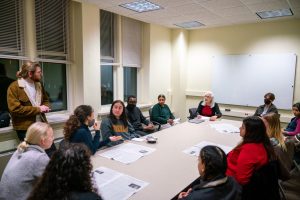Pondering Cross-Atlantic Pedagogies
March 4, 2011
The syllabus of my first history class at Oberlin College stated that the class would have six discussion sessions that would last the entire class. As an exchange student, I was very surprised and thought that this would never be possible because students would not have enough things to say. I was wrong. During the first discussion session, students talked for eighty minutes, the professor hardly ever intervened and I was the one feeling lost.
As I went through the semester, I realized that this experience was a common scenario for humanities classes in Oberlin College. That’s precisely where the difference of teaching methods between my home country France and the United States lies. Where the former country privileges lectures and assimilation of knowledge, the latter emphasizes discussions and personal opinions. I believe that the teaching method in Oberlin would benefit from long and in-depth lectures. I also believe that French students would be less passive if there were more discussion in their classes.
As a student, I expect professors to explain a particular subject, give us facts and data and highlight what the professional field knows. Hence my surprise when I saw some professors apologizing for giving a lecture to the class! It seems like the lecture format is not a praised one in Oberlin. Rather than hearing experts on a subject, students are asked to discuss giving their personal opinions and thoughts.
From my experience, students will raise their hand, start by “Well, hmm, yeah … I don’t know … Well, I think that …” and then share a personal experience or a thought. Participation often means “say anything” rather than “share a fact or ask a question.” However, it can sometimes lead to very eloquent comments. Actually, I hear more insightful comments than what originally I expected. Yet this does not change my belief that a class session is sometimes made up entirely of students’s comments, rather than actual knowledge from an expert. I often found myself leaving the class with nothing in my notebook besides unanswered questions, because the core of the discussion was what students thought the answer of a question could be. Yet the professor never acknowledged what the answer was.
Sometimes, I miss lectures like the ones I have in France. We are given knowledge and data by experts in order to forge an opinion based on those facts, and not on how we feel. That being said, I don’t think that discussions shouldn’t exist. I believe they are a very important part of our liberal education and that, if well done, can provide a forum where we can put in perspective what we learned during the class. In my home school, discussions are important as well, but are in a completely different format. When students speak up, they share their knowledge of one author, highlight the author’s arguments and answer a question by putting together the information given by experts.
The French could benefit from one aspect of the American teaching method. In France, we do not display our personal opinions and thoughts. Rather we combine experts’s knowledge and make an argument. This is an efficient way of learning; yet in doing so, we do not enhance our personal thinking and criticism as much as our knowledge of a professional author on a given subject.
Knowledge and discussions are two very important parts of college education. I believe classes should emphasize lectures to provide students with the necessary background and information on a given subject. It will then enable constructive discussions and in-depth comments based on that information. Yet professors are the key element to classes, and discussion can be as meaningful and interesting as lectures if given by professors who can share their expertise on the subject that they’re teaching.

























